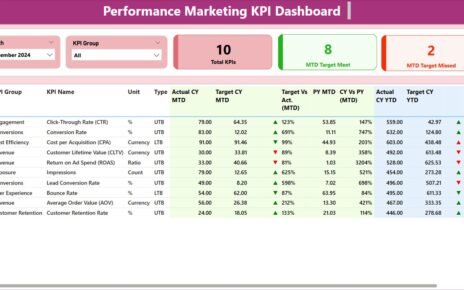The Digital Marketing KPI Dashboard in Power BI is a versatile and user-friendly solution for tracking, managing, and visualizing your key performance indicators (KPIs). Whether you’re monitoring ad campaigns, website performance, or customer engagement, this dashboard simplifies complex data into actionable insights Digital Marketing KPI Dashboard.
In this article, we’ll dive deep into the features, advantages, and best practices for using the Digital Marketing KPI Dashboard in Power BI. By the end, you’ll also find answers to some frequently asked questions Digital Marketing KPI Dashboard.
Click to Digital Marketing KPI
What is a Digital Marketing KPI Dashboard?
A Digital Marketing KPI Dashboard is a centralized interface that displays essential metrics and KPIs related to your marketing efforts. Built using Power BI, this dashboard offers dynamic visuals, interactivity, and the ability to drill into specific data points.
Key Features of the Digital Marketing KPI Dashboard in Power BI
This dashboard is designed to be comprehensive yet easy to use, catering to the needs of both marketers and data analysts. Here’s a breakdown of its main features:
Summary Page
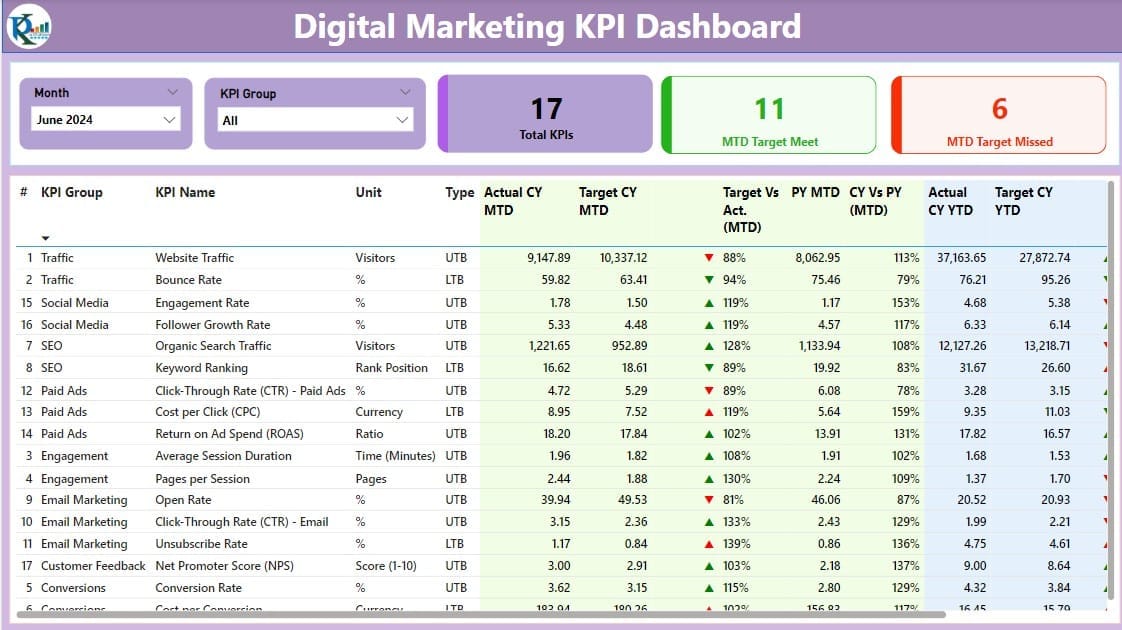
Click to Digital Marketing KPI
The Summary Page is the heart of the dashboard, offering a quick overview of your KPIs.
- Slicers: Use Month and KPI Group slicers at the top to filter data.
- Cards:
- Total KPIs Count: Displays the total number of KPIs tracked.
- MTD Target Meet Count: Shows the count of KPIs meeting the monthly targets.
- MTD Target Missed Count: Highlights the number of KPIs that fell short.
- Detailed KPI Table: Displays the following:
- KPI Number: Sequence number for each KPI.
- KPI Group: The category of the KPI.
- KPI Name: Descriptive name of the KPI.
- Unit: Unit of measurement (e.g., percentage, count).
- Type: Indicates whether “Lower is Better” (LTB) or “Upper is Better” (UTB).
- Actual CY MTD: Current year month-to-date (MTD) actual value.
- Target CY MTD: Target MTD value for the current year.
- MTD Icon: Visual indicators (▲ and ▼ in green and red) to compare MTD actuals against targets.
- CY vs. PY (MTD): Percentage comparison of Current Year MTD vs. Previous Year MTD.
- YTD Metrics: Similar metrics for year-to-date (YTD) values, including comparisons, targets, and visual indicators.
Click to Digital Marketing KPI
KPI Trend Page
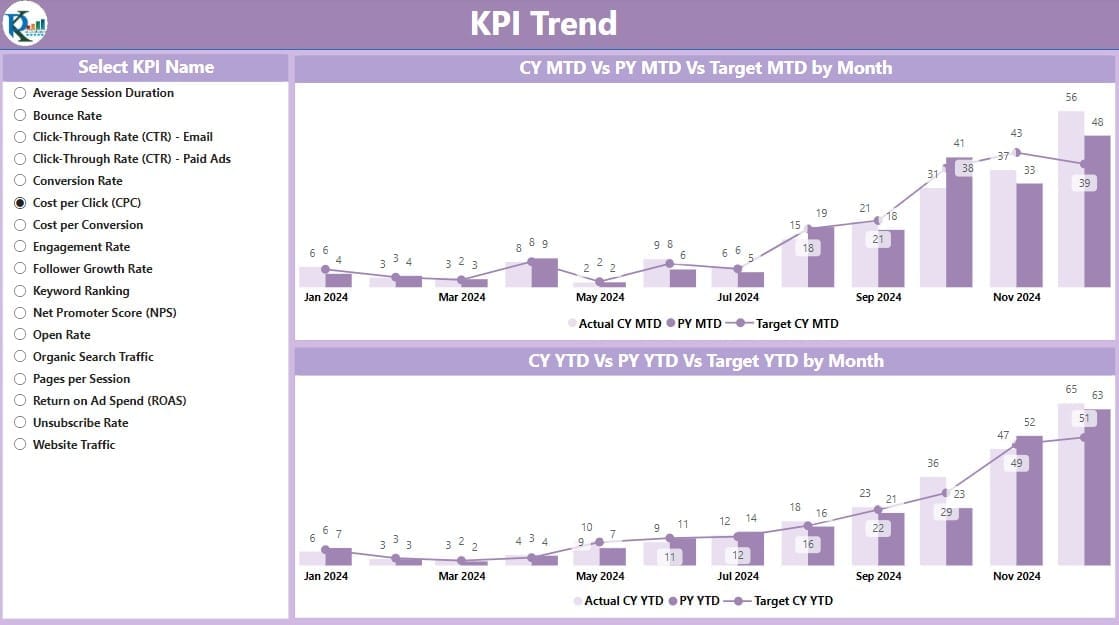
This page offers trend insights for better decision-making.
- Combo Charts: Visualize the actual numbers (Current Year, Previous Year) and targets for MTD and YTD.
- KPI Slicer: Select specific KPIs to focus on their trends.
KPI Definition Page
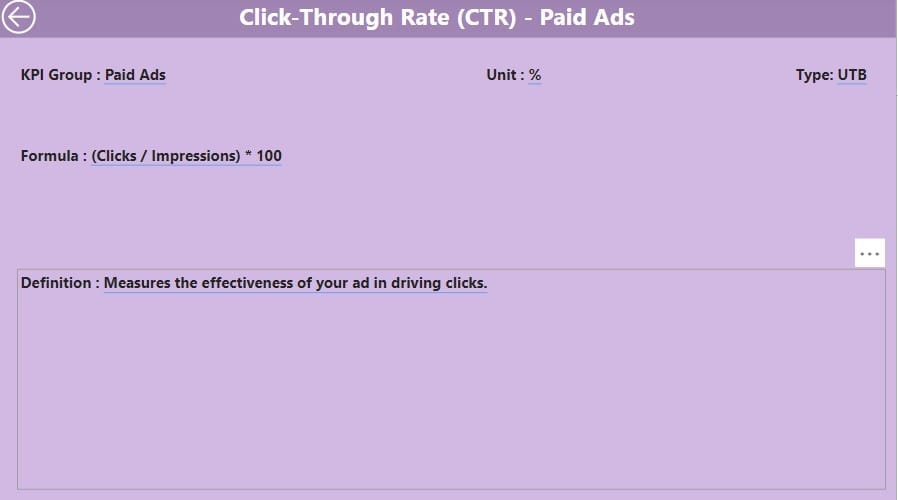
Click to Digital Marketing KPI
Drill into details using the KPI Definition Page.
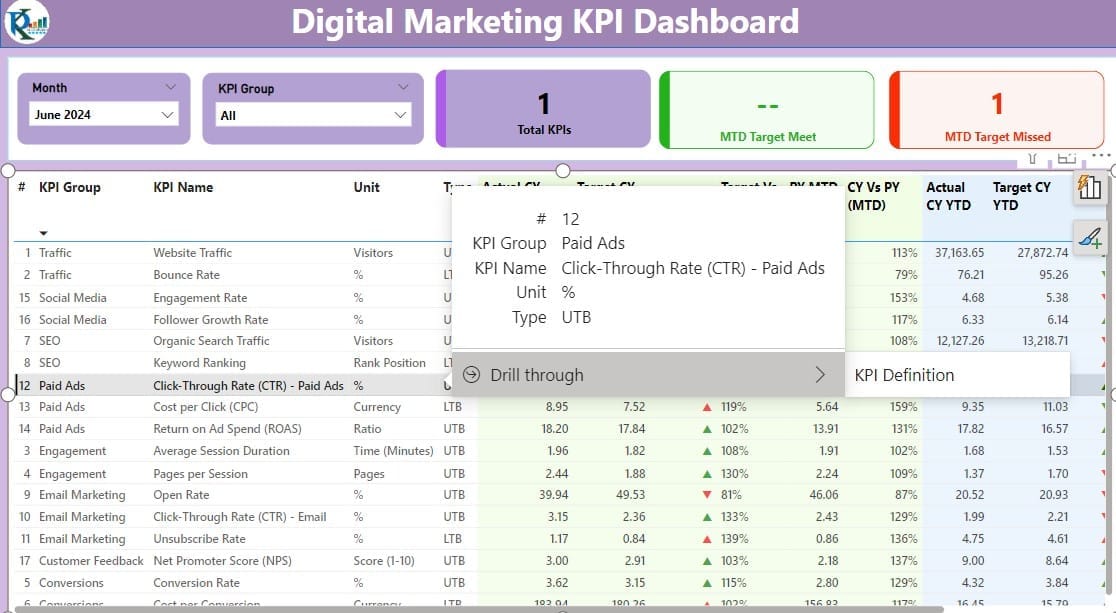
- Details Available: Formula and KPI definitions.
- Interactive Navigation: Use the back button on the top-left corner to return to the Summary Page.
Excel Data Integration
- The dashboard uses an Excel file as its data source, making data entry simple and accessible.
Input Actual Sheet:
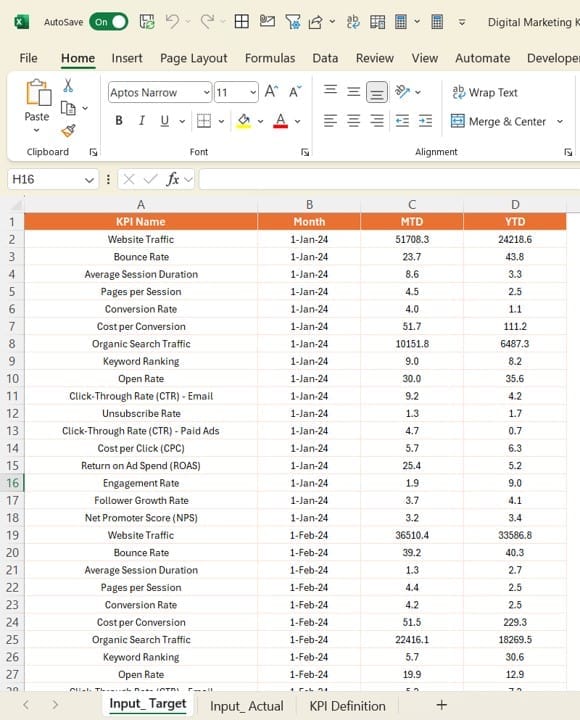
- Enter actual KPI numbers for each month (first date of the month) along with MTD and YTD values.
Click to Digital Marketing KPI
Input Target Sheet:
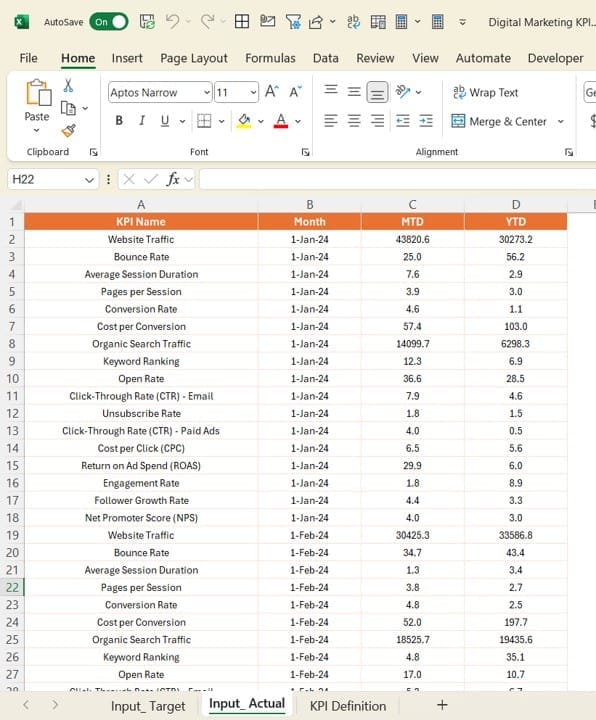
- Enter target numbers for each KPI, similar to the actuals.
KPI Definition Sheet:
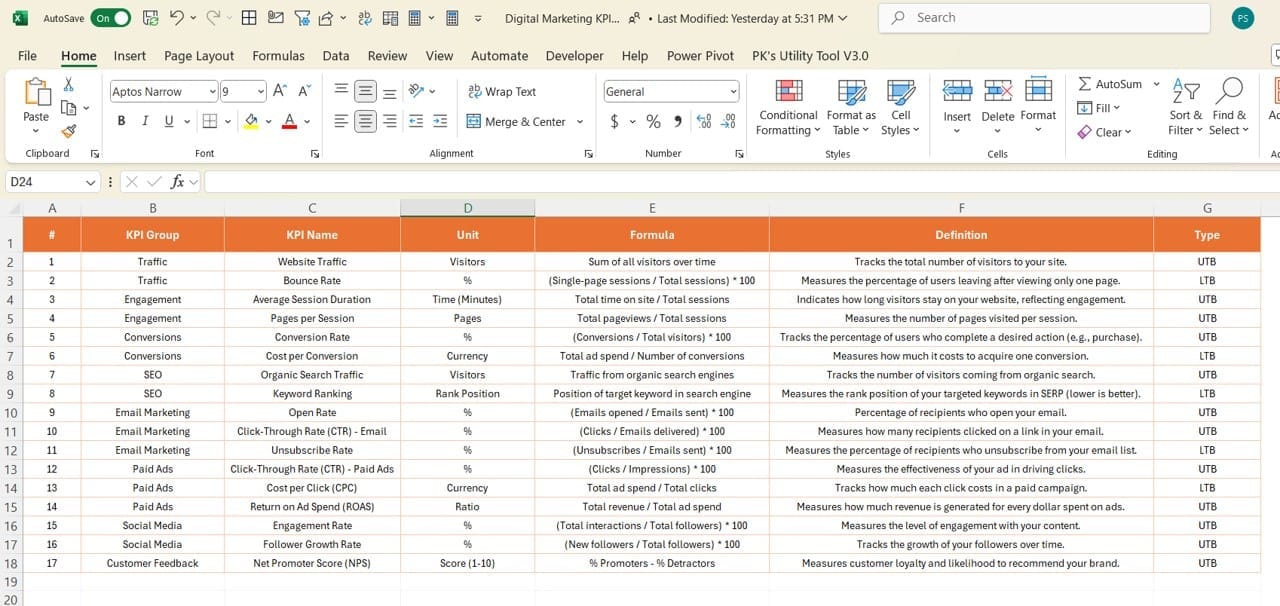
- Define the KPIs by filling in the KPI Number, Group, Name, Unit, Formula, and Type.
Advantages of the Digital Marketing KPI Dashboard
- Enhanced Visibility: Monitor all your KPIs in one place with clear visuals and interactive features.
- Data-Driven Decisions: Get real-time insights to make informed marketing strategies.
- Time-Saving: Automatically updates from the Excel data source, reducing manual effort.
- Customizable: Tailor the dashboard to your organization’s specific needs.
Best Practices for Using the Digital Marketing KPI Dashboard
- Standardize Your Data: Ensure consistency in the Excel data entry fields to avoid errors in the dashboard visuals.
- Regular Updates: Keep the Actual and Target sheets updated monthly for accurate comparisons.
- Utilize Drill-Through Features: Use the KPI Definition page to understand the formula behind each metric.
- Leverage Trends: Use the KPI Trend page to identify seasonal patterns and performance dips.
- Involve Stakeholders: Share the dashboard with your team to encourage collaborative decision-making.
Click to Digital Marketing KPI
Opportunities for Improvement
Even with its robust features, there are ways to make the most out of this dashboard:
- Automate Data Entry: Connect your Excel sheet to other tools like Google Analytics or CRM systems for real-time data.
- Add Custom Pages: Consider adding pages for campaign-specific insights, such as ad performance or social media metrics.
- Incorporate Alerts: Use Power BI alerts to get notified when KPIs deviate significantly from targets.
Conclusion
The Digital Marketing KPI Dashboard in Power BI is a must-have tool for any marketing team. Its user-friendly design, interactive features, and integration capabilities make it an indispensable asset. Whether you’re tracking MTD performance or diving deep into YTD trends, this dashboard ensures you stay on top of your marketing game.
Frequently Asked Questions (FAQs)
Q. How can I customize the KPI Dashboard for my team?
You can customize slicers, add new visuals, and modify Excel data sources to align with your team’s unique KPIs.
Q. What types of businesses can benefit from this dashboard?
This dashboard is suitable for businesses of all sizes, including digital agencies, e-commerce stores, and in-house marketing teams.
Q. Can I use other data sources besides Excel?
Yes, Power BI supports integration with a variety of data sources, including Google Analytics, SQL databases, and cloud services.
Q. How often should I update the data?
It’s best to update the Excel sheets at least monthly to maintain accurate and actionable insights.
Q. What are the system requirements for using this dashboard?
You’ll need Power BI Desktop installed on your system and Microsoft Excel for data entry.
Click to Digital Marketing KPI
Visit our YouTube channel to learn step-by-step video tutorials
View this post on Instagram

